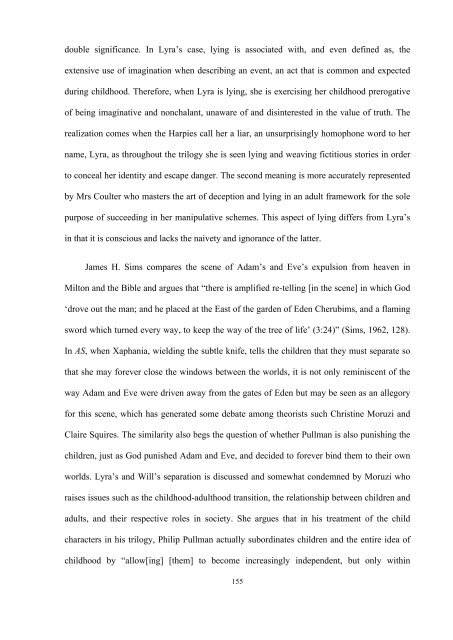The secular angel in contemporary children's literature: David ...
The secular angel in contemporary children's literature: David ...
The secular angel in contemporary children's literature: David ...
Create successful ePaper yourself
Turn your PDF publications into a flip-book with our unique Google optimized e-Paper software.
double significance. In Lyra’s case, ly<strong>in</strong>g is associated with, and even def<strong>in</strong>ed as, the<br />
extensive use of imag<strong>in</strong>ation when describ<strong>in</strong>g an event, an act that is common and expected<br />
dur<strong>in</strong>g childhood. <strong>The</strong>refore, when Lyra is ly<strong>in</strong>g, she is exercis<strong>in</strong>g her childhood prerogative<br />
of be<strong>in</strong>g imag<strong>in</strong>ative and nonchalant, unaware of and dis<strong>in</strong>terested <strong>in</strong> the value of truth. <strong>The</strong><br />
realization comes when the Harpies call her a liar, an unsurpris<strong>in</strong>gly homophone word to her<br />
name, Lyra, as throughout the trilogy she is seen ly<strong>in</strong>g and weav<strong>in</strong>g fictitious stories <strong>in</strong> order<br />
to conceal her identity and escape danger. <strong>The</strong> second mean<strong>in</strong>g is more accurately represented<br />
by Mrs Coulter who masters the art of deception and ly<strong>in</strong>g <strong>in</strong> an adult framework for the sole<br />
purpose of succeed<strong>in</strong>g <strong>in</strong> her manipulative schemes. This aspect of ly<strong>in</strong>g differs from Lyra’s<br />
<strong>in</strong> that it is conscious and lacks the naivety and ignorance of the latter.<br />
James H. Sims compares the scene of Adam’s and Eve’s expulsion from heaven <strong>in</strong><br />
Milton and the Bible and argues that “there is amplified re-tell<strong>in</strong>g [<strong>in</strong> the scene] <strong>in</strong> which God<br />
‘drove out the man; and he placed at the East of the garden of Eden Cherubims, and a flam<strong>in</strong>g<br />
sword which turned every way, to keep the way of the tree of life’ (3:24)” (Sims, 1962, 128).<br />
In AS, when Xaphania, wield<strong>in</strong>g the subtle knife, tells the children that they must separate so<br />
that she may forever close the w<strong>in</strong>dows between the worlds, it is not only rem<strong>in</strong>iscent of the<br />
way Adam and Eve were driven away from the gates of Eden but may be seen as an allegory<br />
for this scene, which has generated some debate among theorists such Christ<strong>in</strong>e Moruzi and<br />
Claire Squires. <strong>The</strong> similarity also begs the question of whether Pullman is also punish<strong>in</strong>g the<br />
children, just as God punished Adam and Eve, and decided to forever b<strong>in</strong>d them to their own<br />
worlds. Lyra’s and Will’s separation is discussed and somewhat condemned by Moruzi who<br />
raises issues such as the childhood-adulthood transition, the relationship between children and<br />
adults, and their respective roles <strong>in</strong> society. She argues that <strong>in</strong> his treatment of the child<br />
characters <strong>in</strong> his trilogy, Philip Pullman actually subord<strong>in</strong>ates children and the entire idea of<br />
childhood by “allow[<strong>in</strong>g] [them] to become <strong>in</strong>creas<strong>in</strong>gly <strong>in</strong>dependent, but only with<strong>in</strong><br />
155
















